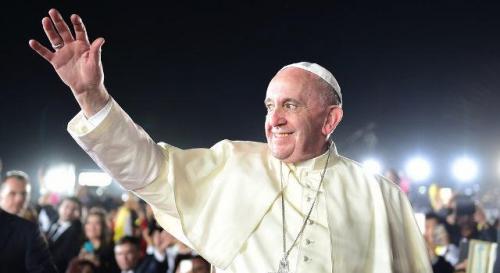With Pope Francis the Western Church ends and the Universal Church begins
- Opinión

The Papacy of Francis, Bishop of Rome and Pope of the Universal Church is now five years old. Many detailed and brilliant accounts have been made about this new spring that has emerged in the Church. For my part, I will emphasize only a few points that are of interest to our reality.
The first point is how the figure of the Papacy, personally lived by Francis himself, has been revolutionized. It no longer is the imperial Pope, with all the symbols inherited from the Roman emperors. Francis himself appears as a simple person, as someone who belongs to the people. His first words on greeting the people were to say, “buona sera”: "good evening". Then, he presented himself as the Bishop of Rome, called to lovingly guide the Church that exists all over the world. Before offering the official Papal Blessing, he asked the people to bless him. He chose to live, not in a palace -- that could have made Francis of Assisi cry-- but in a guest house. And there he dines with all the guests.
The second important point is the joyful announcing of the Gospel, as a super abundance of the good life, rather than as the doctrine of the catechisms. It is not about taking Christ to the secularized world, but about discovering the presence of Christ in the world, through the thirsting for spirituality that can be seen everywhere.
The third point is the three poles found at the center of his activities: the encounter with the living Christ, the passionate love for the poor, and the caring for Mother Earth. At the center is Christ, not the Pope. The living encounter with Christ has primacy over doctrine.
Instead of the law, he tirelessly announces mercy and the revolution of tenderness, as he told the Brazilian bishops when he traveled to Brazil.
He expressed the love of the poor in his first official intervention: “how I would like the Church to be the Church of the poor”. He met with the refugees arriving at the island of Lampedusa, in South Italy. There he had strong words for a certain type of modern civilization that has lost its sense of solidarity and no longer knows how to cry for the suffering of the other.
He raised the ecological alarm with his encyclical letter Laudato Si: About the Caring for the Common Home (2015), addressed to all of humanity. It shows a clear awareness of the risks run by life and the Earth-systems. He therefore expands the ecological discourse beyond environmentalism. He emphasizes that we must create a global ecological revolution (n.5). Ecology is integral, and not only green, because it involves society, politics, culture, education, everyday life and spirituality. It unites the cry of the poor with the cry of the Earth (n. 49). It invites us to feel as our own the pain of nature, because we are all interconnected and involved in a network of relationships. Pope Francis asks us «to nourish a passion for caring for the world … a mysticism that drives us, inner incentives that move, motivate, encourage and give meaning to personal and community actions» (nº 216).
The fourth important point has been to portray the Church not as a closed castle surrounded by enemies, but as a field hospital that serves everyone, without consideration of class, color or religious beliefs. A Church that is always moving towards the others, especially towards the existential peripheries that abound in the world. The Church must serve as an incentive to encourage hope, and show a Christ who came to teach us to live as brothers and sisters in love, equality, justice, open to the Father who has the characteristics of the Mother of mercy and goodness.
Finally, the Pope shows with clear consciousness that the Gospel opposes the powers of this world that accumulate to the point of absurdity, leaving a great part of humanity in misery. We live under a system that puts money at its center, that murders the poor and is a predator of the goods and services of nature. Francis has the harshest words for them. He dialogues with all the religious and spiritual traditions. In the ceremony of the washing of the feet, on Holy Thursday, there was a little Muslim girl.
Pope Francis wants the Churches, with their differences, to unite in the service of the world, especially in the service of the most helpless. This is the true ecumenism in mission.
With this Pope, who “comes from the end of the world”, a Western Church ends and a Universal Church begins, suited to the planetary phase of humanity, called to incarnate itself in the different cultures and to build there a new face, starting from the inexhaustible wealth of the Gospel.
03-23-2018
- Leonardo Boff, Eco-Theologian-Philosopher, Earthcharter Commission
(Free translation from the Spanish sent by Melina Alfaro, alfaro_melina@yahoo.com.ar. Done at REFUGIO DEL RIO GRANDE, Texas, EE.UU.)
Del mismo autor
- O risco da destruição de nosso futuro 05/04/2022
- Reality can be worse than we think 15/02/2022
- ¿Hay maneras de evitar el fin del mundo? 11/02/2022
- Há maneiras de evitar o fim do mundo? 08/02/2022
- The future of human life on Earth depends on us 17/01/2022
- El futuro de la vida depende de nosotros 17/01/2022
- A humanidade na encruzilhada: a sepultura ou… 14/01/2022
- “The iron cage” of Capital 04/01/2022
- Ante el futuro, desencanto o esperanzar 04/01/2022
- Desencanto face ao futuro e o esperançar 03/01/2022
